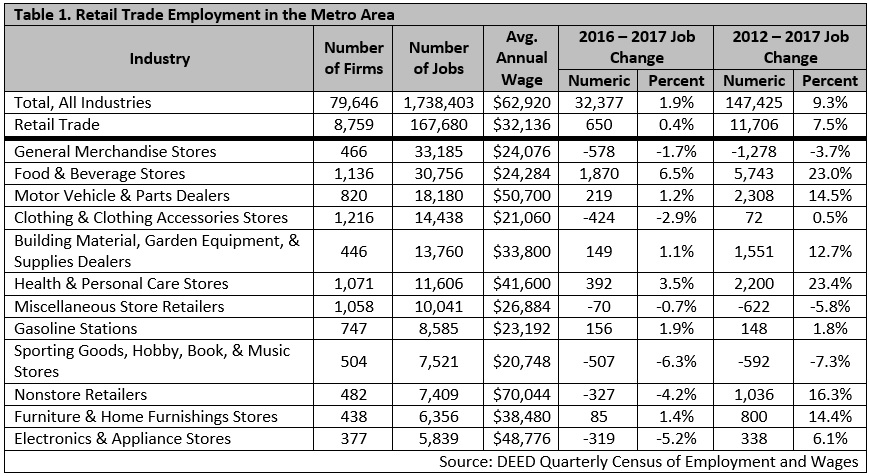Retail Trade is vital to the seven-county Twin Cities Metro Area. With 8,759 establishments supplying nearly 168,000 jobs, it is the region’s third largest-employing industry sector (and less than 2,000 jobs from the region’s second largest-employing industry sector, manufacturing). About one in every ten Metro Area jobs is in Retail Trade.
Retail Trade is a diverse industry sector consisting of two main types of retailers: store and nonstore. Store retailers operate at fixed point-of-sale locations, typically with much advertisement. Examples of store retailers include clothing stores, gasoline stations, office supply stores, and automotive dealers, among others. Nonstore retailers communicate with customers through infomercials, paper and electronic catalogs, door-to-door solicitation, in-home demonstration, portable stalls, and vending machines.
Table 1 highlights the major subsectors within Retail Trade. For example, General Merchandise Stores (Department Stores, Warehouse Clubs and Supercenters) is the largest-employing retail subsector, with over 33,000 jobs. Food and Beverage Stores (Grocery Stores; Specialty Food Stores; and Beer, Wine, and Liquor Stores) is the second largest-employing retail subsector, with nearly 31,000 jobs. Food and Beverage Stores added over 5,700 jobs in the Metro Area over the past five years of annual data; General Merchandise Stores lost nearly 1,300 jobs during that same time.

Overall, Retail Trade has grown more slowly in the Metro Area than the overall economy. Between 2010 and 2017, for example, Retail Trade added 14,729 jobs, expanding by 9.6 percent. During the same time, all employers added 201,362 jobs, expanding by 13.1 percent. While Retail Trade has experienced moderate growth since the end of the Great Recession, it is still about 1,755 jobs below the pre-recessionary level of employment it hit in 2007 (Figure 1).

The top-ten employing occupations within Retail Trade include:
- Retail Salespersons ($11.73 median hourly wage)
- Cashiers ($10.86 median hourly wage)
- Stock Clerks and Order Fillers ($11.90 median hourly wage)
- Supervisors of Retail Salespersons ($20.57 median hourly wage)
- Customer Service Representatives ($18.91 median hourly wage)
- Automotive Services Technicians and Mechanics ($20.66 median hourly wage)
- Pharmacy Technicians ($18.46 median hourly wage)
- General and Operations Managers ($49.54 median hourly wage)
- Combined Food Preparation and Serving Workers ($10.71 median hourly wage)
- Laborers and Freight, Stock, and Material Movers ($15.71 median hourly wage)
As of the second quarter of 2018, employers reported over 11,000 job vacancies within sales and related occupations in the Metro Area. This represents a 21.9 percent increase in the number of vacancies from the previous year, and is the highest number of sales and related vacancies ever reported by employers in the Metro Area in the job vacancy survey’s history. Clearly, retail sales jobs are in high demand.
With a diverse array of subsectors and occupations, Retail Trade is guaranteed to remain a vital industry sector.
For More Information
Contact Tim O’Neill at 651-259-7401.


